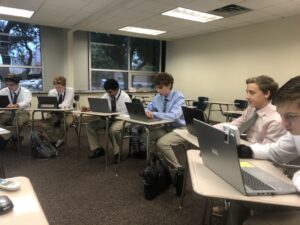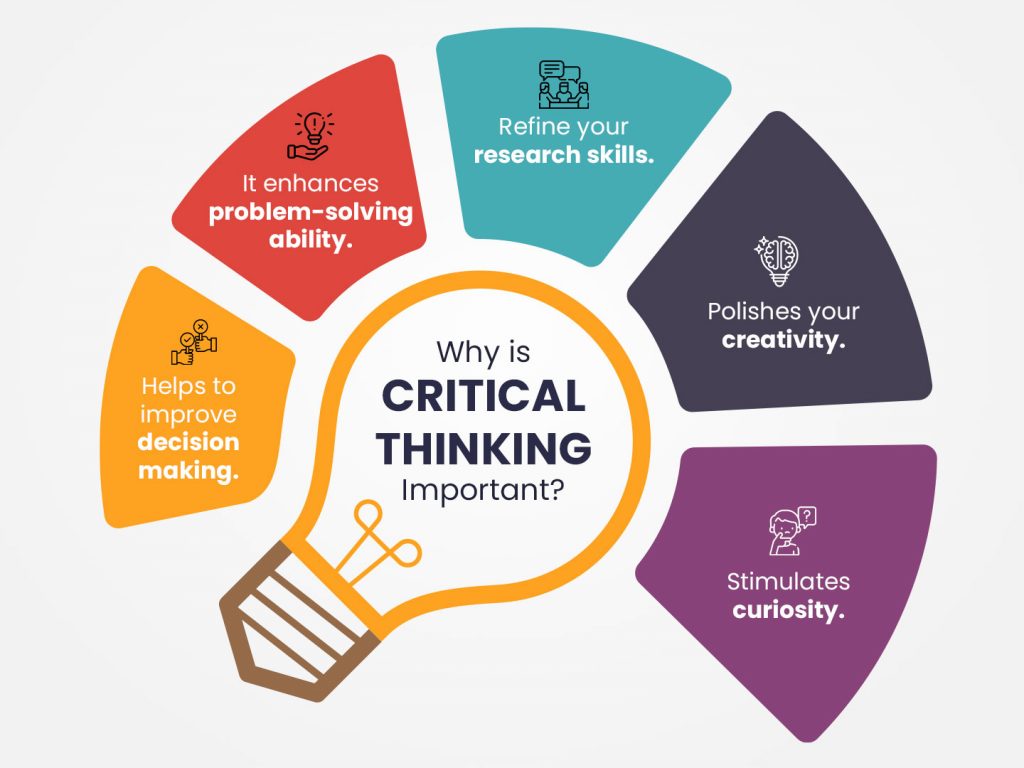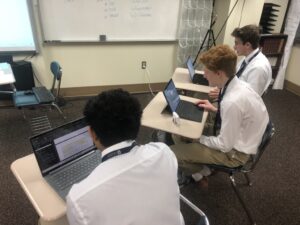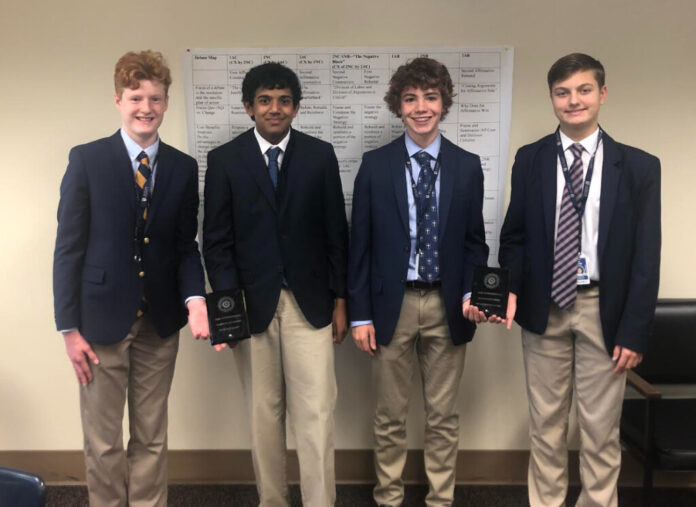The two debaters file into the classroom, laptops, and pens in hand. They sit down and open up their laptops to begin the online debate. For the next two hours these two will face down their two opponents, and debate about cybersecurity, the North Atlantic Treaty Organization, and foreign policy. Win or lose, the debaters will discover an immense amount of knowledge on an extremely timely issue. This knowledge will not be just limited to the debate that they participated in, it will remain with them for the rest of their lives.
The scene I just described is what occurred two weeks ago during the Westminster School [GA] debate tournament, where a number of Jesuit debate teams faced tough competition from schools from around the United States and even Taiwan. Although a report on the successes of the team during that tournament will be published soon, for this article I will focus on another area – the knowledge and skills debaters attain during tournaments.
I interviewed three young and talented freshmen debaters, greener than summer grass, to ask them about what they have gotten out of the debate. Although the varsity is well deserving of its own article (which my fellow Roundup writer Lawrence Jin will cover), the freshmen provide a unique perspective on debate. For all of them, this is their first year debating, and it’s quite a transition.
Freshman Year in Debate
Freshmen year is when most debaters tryout for the team, and like joining any new sport or extracurricular, the unfamiliar experience can be jarring. New debaters, or novices as they are called in the debate community, have to learn new skills and strategies as well as content about the season’s topic. This year’s debate topic is: The United States Federal Government should substantially increase its security cooperation with NATO in one or more of the following areas: artificial intelligence, biotechnology, and cybersecurity.
As a junior who has been debating with Jesuit for 2 years, I know what that jarring experience is like. I was confused by the way debates were structured, and how to utilize prep time to come up with arguments about topics I didn’t know about before debate. But I enjoyed learning about how the criminal justice system (the debate topic for my freshmen year) is operated and maintained, and as someone with a parent who is a lawyer, I found it very relevant to my background.
What drew me to debate, and why I will continue to participate in the activity, is the knowledge and life skills I gain from the experience. Every day in debate, I learn something new about a variety of topics.

Given Russia’s war in Ukraine, great power competition with the US vs Russia and China, heightened tensions, and major improvements in technology throughout the world, it’s clear that this topic is extremely relevant to current events. One of the strengths of debate is that it forces people to debate on a specific, relevant issue that in turn increases their topic knowledge of that area. The three freshmen I interviewed all had different experiences with debate.
Ethan Irrobali
In addition to being a debater, Ethan Irrobali is a freshman at Jesuit who runs for the Jesuit cross-country team. The Westminster debate tournament was his first-ever debate tournament.

What was the most unexpected part of debating in your first tournament?
This was my first tournament. I was caught off guard by the pace of the debate. I don’t think I was prepared for how fast everything was going to be, but flowing (a term for when debaters will write what their opponents are saying) helped.
You debated five rounds and also went into the elimination rounds, did you feel tired by the end of it?
Yes, especially on the second day on Saturday my partner and I were really tired.
Going forward into future tournaments, what is something that you want to improve on from this tournament?
I would say that I can improve my organizational skills, by getting a good night’s sleep before the tournament, and trying to do more prep throughout the week before the tournament begins.
“I think i’ve learned how to be articulate with my words… and to listen to what the other side is saying.”
When you’ve been debating, what’s one important skill that you’ve picked up?
I would say I learned how to focus on specific pieces of evidence that were important, with the important dates and warrants of that evidence that matters more than just reading the evidence.
What life skill do you think you’ve gotten out of debate?
I think I have learned how to be articulate with my words, and if I need to defend my position I need to refute what people are saying. I also know how to listen to what the other side is saying, and respond to that.

What do you think about this year’s topic?
I think it perfectly relates to this year’s events, and I think a lot of people have a lot of knowledge on it because of the war in Ukraine, as well as NATO’s current situation which makes people really interested in it. That makes the topic very interesting to debate over.
How do you think that this knowledge of NATO or foreign policy will help you in the long run?
I think this will be helpful because this will be a topic of discussion later on in life, I also think that if you ever need to defend your position on something you can refute them and offer specific warrants why.
How has debate helped you with the notion of intellectual competence at Jesuit?
I think debate has made me more intelligent, as well as learning to learn better by taking notes. I also think that I’m gaining knowledge on a topic that I didn’t know much about, so it’s allowing me to be more immersed in knowledge.
Nathan Pascas
Aside from debate, Nathan Pascas also participates in the Environmental Society, Jesuit Roundup, and the Men’s Chorus.

Nathan, what motivated you to join the debate team?
Many people know that I have an argumentative nature, and I like to be invested in current events. I was very interested in the competitive aspect and I believed that I had the current events knowledge to compete.
What specific current event knowledge do you think you’re knowledgeable in?
I believe that I am most interested in politics. The reason is that I read a lot about current events and national/world news.

What about the recent tournament at Westminster did you enjoy?
I think compared to my first tournament, it was a tough competition but I still enjoyed it, learned a lot. Also, I developed a strong bond with my fellow debaters.
Could you describe that bonding experience?
I think a lot of it is having to have good communication skills with your partners because you’re stuck in a room for 2 hours debating and you got to win a debate against two other random people, from a different state hundreds of miles away. You have to talk and interact with them a lot.
“Within debate practices, I learn a lot about the world and different viewpoints on how people express their ideas.”
The theme of this school year is intellectual competence, what about debate particularly accesses this intellectual competence?
Debate in general is a very intellectually rigorous activity. Within debate practices, I learn a lot about the world and different viewpoints on how people express their ideas, alongside how they challenge other people’s opinions. I also learned about factors that influence current geopolitical states.
What about the NATO topic do you like the most?
I think it’s very relevant to the current global conflict, lots of people are worried about war with Russia amidst Ukraine. I think it’s given me a lot of insight into this particular topic because so many people are worried about it.
Alex Ramsey
Aside from debate, Alex Ramsey also participates in the Chinese Club, Entrepreneurship Club, and Esports Team.

Alex, what drew you to debate?
It’s a really intellectual sport, there’s a lot of logic and critical thinking behind it. It’s a lot of fun to think about it outside of debate because there’s so much to learn about.
Do you think that debate reinforces or creates critical thinking skills?
I think that everyone has them to a certain degree, but you really have to practice critical thinking skills in a debate with an opponent.
“[Debate] is a really intellectual sport, there’s a lot of logic and critical thinking behind it… there’s so much to learn about.”
What does this practice look like?
We’ll do drills in practice like we’ll be given an argument and we have to come up with arguments against it and then we have to come up with arguments against our arguments! It helps create these logic chains of debate.

Do you think that debate should be taught in middle school?
I think it would be beneficial if you started offering debate in middle school, particularly in 7th or 8th grade.
Why do you think that critical thinking skills are so important in today’s world?
Because right now there’s a lot going on in the world, the debate topic is very relevant to this year. This discussion is important to start young, to start thinking of your opinions of the world so you can help push the world towards a greater tomorrow.
What do you think is the most important issue in the world right now that can be solved with these critical thinking skills?
I would say climate change. I feel that it’s a bigger issue than most people give it credit for but if we put effort into stopping it’s something we can stop with critical thinking skills. We just aren’t putting enough effort into it. Critical thinking skills would look like plans to solve, research, debating over ideas, and more.
If you had to pick one reason why you joined the debate team, what would it be?
The biggest reason I joined debate is that none of the other sports or opportunities really spoke to me and when I tried to debate it was a welcoming community, and it was a really fun and unique experience. One of those experiences was when Ethan Irrobali and I debated a team from Highland Park and it was the most interesting debate to think about afterward. We debated on cyber security, Article 5 of NATO, and European strategic autonomy. During the debate it felt very organized, it was an amazing experience to debate those guys for 2 hours.

Conclusion
Two consistent benefits of debate emerged from all three interviews. First, debate tournaments are engaging because we debate very timely issues like the war in Ukraine and other current events. Langdon Carver, another freshman debater, commented that “My favorite part of debate is the topic, with AI, biotechnology, and cybersecurity being at the forefront of everyone’s discussions. This interests me because these things are going to be the new things that everyone will have in their lives.”
Second, debate tournaments increased their intellectual competence in a number of ways, including critical thinking skills and understanding the opponent’s arguments. Langdon additionally stated that “Debate helps you in every part of life. When St. Ignatius said ‘go set the world aflame’ debate would make that easier by pushing us to change the world.”
Thus, with Jesuit’s theme this year from the Profile of the Graduate at Graduation of intellectually competent, debate provides an invaluable gateway to achieving that intellectual competence. Debate pushes people to analyze ideas and critique them. It pushes people to think about the causes and effects of an action, and make broader connections to these ideas. It’s clear that the students who have participated in these early season tournaments clearly have experienced a taste of those skills.






